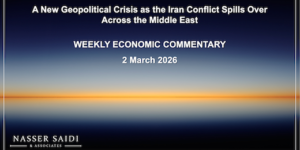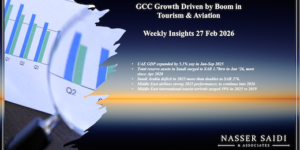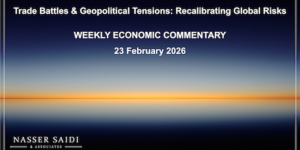Markets
The last two days in Oct saw a rebound of US equity prices ending a dreadful month on a positive note. The S&P 500 in Oct relinquished most of its gains in 2018, losing 6.5% from its Sep peak. Global equities lost 6.4% over the month with Japan leading the rout with a -10% slump. The new month’s sessions saw wide fluctuations on Wall Street driven by rhetoric related to the trade war: while Trump sounded a conciliatory note towards China, White House adviser Kudlow on Fri ruled out an imminent deal ending the trade war. The downbeat results of Facebook and Apple threw once again the tech sector into disarray. Other major bourses followed the positive Wall Street streak (supported by upbeat earnings) with Japan as the frontrunner and the European Stoxx600 displaying its best week since Dec 2016. Even the battered emerging market equities (including many in our region) extended their rally to a 4-week high. In currency markets the USD continued its uptrend on major crosses: the dollar index saw the 7th consecutive monthly rise in Oct setting a record high for the year. Oil prices recorded another weekly decline touching a 3-month low, as US crude oil inventories rose by 3.2 mn barrels and the Trump administration allayed fears over supply shortages, allowing 8 countries to import Iranian oil despite the US sanctions coming into effect tomorrow. Notably, Trump underscored that the US would consider a “new, more comprehensive deal” if the Iranian government modified its policies. Gold prices were barely changed.
Global Developments
US/Americas:
- The US nonfarm payrolls added 250,000 jobs in Oct beating expectations. The Sep figure was revised down to 118,000, while the Aug figure was revised up to 286,000. Average monthly job creation in 2018 was 213,000, vs 182,000 in 2017. Average hourly earnings rose 3.1% yoy – a 9-year high – while the unemployment rate held steady at 3.7% reflecting an increase in labour force participation.
- US non-farm productivity rose 2.2% qoq ann (1.3% yoy) in Q3 down from 2.9% in Q2. Private sector wages and salaries increased 0.8% qoq in Q3 from 0.6% in Q2. Unit labor costs were up 1.2% qoq ann in Q3, offsetting a -1% drop in Q2.
- The US personal consumption expenditure deflator (the inflation gauge followed by the Fed) increased by 0.1% mom (2.0% yoy) in Sep, the same pace as in Aug (2.2% yoy). The core PCE deflator gained 0.2% mom (2% yoy).
- Nominal personal income in the US rose by 0.2% mom in Sep half the rate in Aug. Nominal disposable income growth also slowed to 0.2% from 0.4% in Aug. Wages and salaries, in particular gained 0.2% in Sep, down from 0.5% in Aug.
- Real spending growth in the US decelerated to 0.3% mom in Sep vs 0.4% in Aug pushed by durable goods which surged 1.8% mom. Nondurable goods spending was barely changed and services spending was flat.
- The US ISM manufacturing index chilled out from 59.8 in Sep to 57.7 in Oct with new orders dropping for a second month in a row. The employment index also lost ground while supplier deliveries ticked up.
- New orders for US manufactured goods rose 0.7% mom in Sep vs 2.6% in Aug. Orders for transport equipment were the main driver (1.9% vs 13.3% in Aug), thanks to vehicles & parts (0.5%) and the volatile defense aircraft & parts (118.7%).
- The national CoreLogic-Case Shiller index of existing US home prices slowed to 5.8% yoy in Aug vs 6% in Jul. Construction spending was unchanged mom in Sep after a paltry 0.1% in Aug.
- US initial unemployment claims fell by 2,000, to 214,000. The 4-week moving average rose by 1,750, to 213,750, still close to historical lows. Continuing claims fell further, by 7,000, to 1.631 mn and their 4-week moving average was 1.640 mn.
- US Consumer confidence increased in Oct by 2.6 pts mom to 137.9, thanks to a perky labour market which pushed up present economic situation and consumer expectations. On the negative side inflation expectations increased.
Europe:
- The Eurozone’s GDP growth halved to 0.2% qoq (1.7% yoy) in Q3 from 0.4% (2.2% yoy) in Q2. Probably lackluster manufacturing output, led by automotive, was the main culprit for the slowdown. Growth stalled in Italy and hit the brakes in Germany, while France displayed a buoyant performance.
- Inflation in the Eurozone crawled up to 2.2% in Oct, from 2.1% in Sep due to energy prices (10.6% mom from 9.5%). Core inflation rebounded to 1.1%, from 0.9%, despite a fall in food inflation.
- The stress tests on the major European banks conducted on 2017 data did not highlight any catastrophic risk.
- The Eurozone’s Business and consumer sentiment indicator retreated to 109.8 in Oct from 110.9 in Sep due to the pessimistic manufacturers’ mood. Services and retail sentiment came also on the weak side.
- The unemployment rate in the Eurozone remained at 8.1% in Sep, its lowest since Nov 2008.
- German Chancellor Merkel resigned as leader of the CDU and will not run in the next general elections scheduled for 2021. She will remain Chancellor but the government might not last until 2021.
- German inflation reached 2.5% in Oct from 2.3% in Sep the highest rate since Sep 2008.
- German retail sales rose 0.1% mom (-2.6% yoy) in Sep vs -0.3% (+1.5% yoy) in Aug.
- The Bank of England MPC minutes revealed that the vote to keep the rate unchanged at 0.75% was unanimous and members are not inclined to hike in the near future.
- Italy was on the brink of recession in Q3 as its GDP stalled vs a 0.2% qoq growth in Q2. It was the worst figure since Q4 2014.
Asia Pacific:
- China’s official manufacturing PMI in Oct glided down to 50.2 from 50.8 in Sep, its lowest reading since Jul 2016 and just above the recession threshold. The production subindex dropped to 52 from 53 and new orders to 50.8 from 52.
- The Bank of Japan kept its monetary tools and rates unchanged.
- Japan’s Industrial production plunged -1.1% (-2.9% yoy) mom, following the 0.2% mom gain (0.2% yoy) in Aug. Part of the slump was due to a typhoon and an earthquake that hit the archipelago.
- Japan’s consumer confidence index retreated to 43 in Oct from 43.4 in Sep.
- South Korea’s inflation moved up to 2% yoy in Oct from 1.9% in Sep, due to a 5.6% yoy rise in food beverage prices and a 4.6% rise in transport prices. Core inflation declined to 1.1% from 1.2% in Sep.
- South Korea’s trade surplus shrunk to USD 6.6bn in Oct, down from USD 9.6bn in Sep as a result of a 22.8% yoy surge in exports and a 27.7% rise in imports.
- South Korea’s retail sales fell by -2.2% mom (0.5% yoy) in Sep vs 0.1% in Aug due to lower supermarket spending and, to a lesser extent, convenience and specialty stores.
- Taiwan’s GDP growth slowed to 2.3% yoy in Q3 from 3.3% in Q2. Imports growth accelerated while exports and consumption growth disappointed. Government spending fell.
- Australian inflation was 0.4% qoq in Q3, unchanged from Q2.
Bottom line:The macro data flow depicted once again a decoupling between the vigorous growth in the US and the dull performance elsewhere. Europe seems to have been hit substantially by the repercussions of the trade war. But more generally the Old Continent is mired in the Brexit saga, the escalating confrontation between the EU Commission and the Italian government on the 2019 budget (which has already caused a stagnation in Q3) and the political uncertainty over the succession to Angela Merkel. China and Japan are embroiled in a thorny transition phase which would require bold reforms. Unfortunately, there seems to be very little political appetite for such course of action. Equity markets once again are experiencing the typical late cycle volatility. In only two other circumstances in history stocks were more expensive than today: just before the Great Depression and in the 1999 run-up to the dotcom bubble burst. A poignant smell of tulips pervades Wall Street.
Regional Developments
- Bahrain GDP grew by 2.4% yoy in Q2 2018, supported by the construction (+6.7%) and manufacturing (+4.5%); the oil sector accounted for less than 20% of GDP.
- Bahrain’s net foreign assets declined by –7% yoy to BHD 0.561bn as of end-Sep 2018. Money supply (M2) grew by 2.3% in Sep, after recording a 0.7% increase the month before.
- Bahrainapproved 100% foreign ownership of firms offering oil spill treatment services.
- Bahrain’s central bank approved an initial public offering by port operator APM Terminals Bahrain, which will be listing shares equivalent to 20% of its issued share capital.
- Nogaholding (rated BB- by Fitch), the investment arm of Bahrain’s state-owned oil company, raised USD 1bn (from a book of around USD 2.5bn) through a dual-tranche bond.
- Bahrain approved 13 agreements and MoUs with Egypt and four with UAE: this spans various fields including tourism, urban development, education, transportation and exports, among others.
- The IMF has reached an agreement to disburse USD 2bn to Egypt from the USD 12bn extended fund facility: the staff-level agreement will need executive board approval before the funds are made available.
- Egypt signed a deal with ACWA Power to build a USD 2.3bn power plant, which will be operational by 2023 (latest) and have a capacity of 2250 MW.
- Iraq’s oil exports from the southern ports averaged 3.469mn barrels per day (bpd) in Oct, a tad lower than the 3.56mn bpd exported in Sep, as bad weather slowed shipments. The average sale price was USD 74.912 per barrel in Oct, thereby generating more than USD 8bn in revenue.
- Kuwait’s Emir emphasized that the country needs to continue with economic reforms even through phases of higher oil prices, in a speech to the parliament.
- Kuwait plans to set up a venture capital market to aid its growing startups, disclosed the CEO of Boursa Kuwait. He also stated that the exchange is working on a new offering of products, such as covered short-selling, stock borrowing and lending, real estate investment trusts next year.
- Lebanon’s risk profile is rising sharply, warned the World Bank in its latest Lebanon Economic Monitor report. Fiscal and electricity reforms are highlighted as priorities in the report which projects growth to lie between 1-2% this year.
- Lebanon’s consumer confidence index averaged 75.3 in Q3, a marginal increase from Q2’s 74.2. Delays in formation of the government seem to have led to a stagnation of sentiment: the Present Situation Index averaged 66 in Q3, declining 2.3% qoq.
- Qatar central bank issued QAR 800mn (USD 219.73mn) of TBs, with maturities of three, six and nine months.
- Qatar’s latest law that removes the need for an exit permit came into effect last week; there are some restrictions though: companies can still impose exit permits on up to 5% of their workforce.
- Qatar plans to establish an insurance fund for foreign workers, to “support, ensure and provide care for workers, guarantee their rights and provide a healthy and safe working environment for them”.
- Saudi Arabia’s budget deficit narrowed to SAR 7.3bn (USD 1.95bn) in Q3, from SAR 48.7bn in Q3 2017 and SAR 7.36bn in Q2 2018. Revenues grew by 57% qoq to SAR 223.3bn, thanks to a 63% jump in oil revenues and 45% rise in non-oil revenues (to SAR 69.3bn). Total revenues increased by nearly 50% yoy to SAR 663bn during the Jan-Sep 2018 period.
- Foreign reserves in Saudi Arabia grew by 4.5% yoy and 0.12% qoq to SAR 1.902trn (USD 507.21bn) in Q3 2018. Saudi gold reserves remained stable at SAR 1.624bn in Q3.
- Saudi Arabia announced the sale of SAR 3.25bn (USD 866.44mn) worth local currency Sukuk– divided into three tranches of 5,7 and 10 years.
- Contracts of more than 71% expats working in government jobs in Saudi Arabia have been terminated, reported Al-Watan Arabic daily.
- Saudization will be implemented in three sectors from Nov 9: 70% of jobs in electrical and electronics shops, watch shops and optical stores will be nationalized in this second phase.
- Saudi Arabia revealed the cancellation of USD 6bn of debt owed to the country from least developed countries, as part of the “debt pardoning initiative”.
- Cinema revenue in Saudi Arabia is expected to reach USD 1.5bn by 2030, disclosed PwC.
- Saudi Arabia’s current 5200 construction projects amount to SAR 3tn (USD 819bn) in investments, and account for 35% of the value of GCC’s active projects.
- The World Bank’s Ease of Doing Business 2019 report ranks UAE top in the MENA region and 11th globally (rising 10 places from last year’s ranking of 21). In the GCC, Bahrain came second with an overall ranking of 62 followed by Oman (78), Qatar (83), Saudi Arabia (92) and Kuwait (97). (More: http://www.doingbusiness.org)
- The value of IPOs in the MENA region increased by 21.9% yoy to USD 349.9mn in Q3 2018 from four IPOs, according to the latest EY MENA IPO Eye report. Saudi Arabia led IPO activity in Q3: value increased 21.9% yoy to USD 220.6mn.
UAE Focus
- UAE issued a Foreign Direct Investment (FDI) Law: the new law stipulates that the ceiling of ownership will be raised, and mandates that licensed foreign investment companies shall be granted the same treatment as national companies; a ‘Foreign Direct Investment Unit’ is to be established in the Ministry of Economy, and will be responsible for proposing FDI policies and determining its priorities; in addition, the unit will also establish a database for UAE investments including data on existing FDI projects.
- UAE issued an Anti-Money Laundering law to combat terrorism financing: the law is in line with the requirements of the Financial Action Task Force and recommends the establishment of an independent Financial Information Unit within the central bank to receive and investigate reports of illicit financing activity. The DIFC also updated late last month its AML/CTF rules.
- A new law governing the UAE Central Bank was also issued last week: this updates the old legislation, and he central bank’s capital to AED 20bn (USD 5.45bn) and allows for the establishment of a general reserve of up to four times the paid up capital. (More: https://www.centralbank.ae/en/pdf/DecreeFederalLawNo14of2018En.pdf)
- The UAE central bank issued new conditions for the transfer of retail loans from one bank to another: banks and finance companies’ early repayment commission should not exceed 1% of the remaining amount of the loan, or AED10,000 whichever is less and also cannot increase the repayment period.
- UAE issued a federal decree-law concerning the collection of revenues and public funds with the aim of accelerating the procedures for the claim, execution, settlement and collection of debt.
- The Dubai Blockchain Platform was launched last week:delivered through an IBM Cloud environment and built locally, this is the first government-endorsed Blockchain platform as-a-service in the UAE. The platform will reduce significantly government payment processing times from a current average of 45 days to real-time transfers.
- The Sharjah Chamber of Commerce and Industry disclosed AED 12bn investments from Indian economic enterprises in 2017. The total volume of exports and re-exports of these enterprises reached AED 771mn by end-2017.
- The UAE ranks first globally in five Islamic economic sectors, according to the latest edition of the Global Islamic Economy Report 2018-2019. Malaysia, once again, topped the overall Global Islamic Economy Indicator. According to the DIEDC, the Islamic economy sector contributed 8.3% to Dubai’s GDP in 2016, or AED 33bn.
- Dubai International airport welcomed 7.2mn passengers in Sep (-0.2% yoy), bringing the year-to-date traffic to 67.5mn passengers. India remained Dubai’s top destination country by customer volume in Sep, with total traffic reaching 957,748 during the month.
Media Review
China’s Geoeconomic Influence
https://carnegieendowment.org/2018/10/15/china-s-rise-as-geoeconomic-influencer-four-european-case-studies-pub-77462
EU sanctions on Italy can be imposed much earlier than expected
https://piie.com/blogs/realtime-economic-issues-watch/could-sanctions-against-italy-be-imposed-earlier-expected
The US Fed proposes a sweeping banking deregulation
https://www.bloomberg.com/news/articles/2018-10-31/fed-set-to-propose-eased-standards-for-all-but-the-biggest-banks
8 nations to receive waivers to import oil from Iran
https://www.ft.com/content/40a7b420-deac-11e8-9f04-38d397e6661c
Middle East Firms have USD 400bn in trapped value
http://businessweekme.com/middle-east-firms-are-sitting-on-400bn-in-trapped-value/
Powered by:









